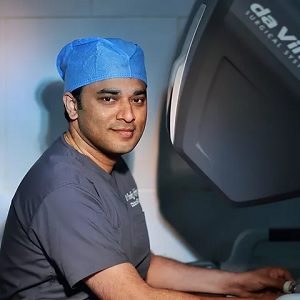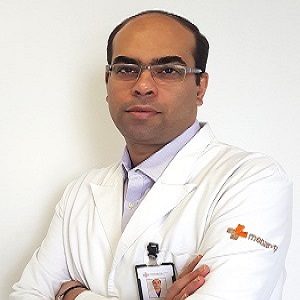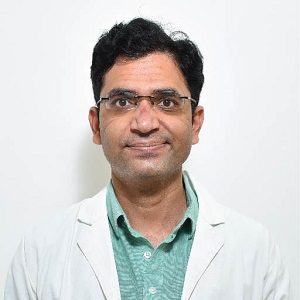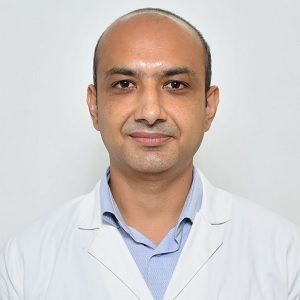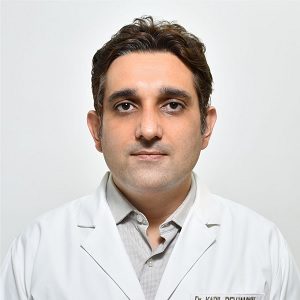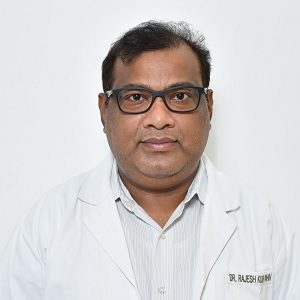Best Doctors in India for Liver Biopsy
- Liver Transplant Surgeon and HPB Surgeon, Chennai, India
- Over 15 years’ experience
Profile Highlights:
- Dr. Selvakumar Naganathan is one of the best liver transplant surgeons in India with nearly 15 years of experience.
- He has carried out more than 2000 procedures, including 300 donor & 500 recipient hepatectomies, cadaver transplantations, retrieval of cadaver livers, and live donor liver transplants.
- He also established many liver transplantation centers across India & other countries.
- General Surgeon and Surgical Gastroenterologist, Chennai, India
- Over 27 years’ experience
Profile Highlights:
- Dr. Raghunath K J is a well-known name in the field of general surgery with an experience of more than 27 years.
- He went under training in advanced Laparoscopic surgery from Canada and France.
- Dr. Raghunath pioneers many prestigious projects in the UK.
- Dr. Raghunath has a specialized interest in Gall Bladder Stone treatment, Hernia, GI Cancer Surgery, Laparoscopic Sleeve Resection, Endoscopic Surgery, etc.
- Colorectal Surgeon and Robotic Surgeon, Chennai, India
- Over 26 years’ experience
Profile Highlights:
- Dr. Venkatesh Munikrishnan is one of the best Gastroenterologists and Colorectal Surgeons in Chennai, having 21 years of experience in managing disorders that need surgical treatment.
- Dr. Munikrishnan specializes in surgical oncology, endoscopy, Gastritis Treatment, etc.
- He is also active in research; one of his research on CT Colonography fetched a grant from Bracco, Milan, Italy.
- GI Surgeon and Liver Transplant Surgeon, Gurugram, India
- Over 20 years’ experience
Profile Highlights:
- Dr. Amit Nath Rastogi is a pioneer in the field of liver transplant surgery. He completed his fellowship in liver transplant surgery at Sir Gangaram hospital while being a part of the largest liver transplant program in the country.
- Furthermore, he received his training in robotic liver surgery from IRCAD -Strasbourg, France, and advanced robotic HPB training from Grosseto.
- Liver Transplant Surgeon, Gurugram, India
- Over 10 years’ experience
Profile Highlights:
- Dr. Prashant Vilas Bhangui is one of the highly trained liver transplant specialists who received his training in Surgical Gastroenterology and Liver Transplantation.
- He also holds a European Inter-University Diploma in Hepato-Biliary-Pancreatic Cancers.
- Dr. Prashant is further interested to work in certain fields which include hepatocellular carcinoma, colorectal liver metastases, and living donor liver transplantation. Besides this, he has also published several journals on these subjects.
- Gastroenterologist, Gurugram, India
- Over 7 years’ experience
Profile Highlights:
- Dr. Abhinandan Mishra is one of the young Gastroenterology doctors in Gurugram who is particularly interested in inflammatory bowel disease treatment.
- Dr. Abhinandan Mishra offers Endoscopic Retrograde Cholangiopancreatography, Ascites tap, Endoscopy, Peroral Endoscopic Myotomy, Capsule Endoscopy, Esophageal Manometry, Magnetic Resonance Cholangiopancreatography, etc.
- Gastroenterologist, Gurugram, India
- Over 18 years’ experience
Profile Highlights:
- Dr. Atul Sharma is a renowned Gastroenterology practitioner in Gurugram and is particularly interested in Third Space Endoscopy and Per Oral Endoscopic Myotomy (POEM).
- He presented several papers on Manometry, Luminal gastroenterology, and interventional Gastroenterology during training in Advanced Interventional GI Endoscopy.
- Gastroenterologist, Gurugram, India
- Over 15 years’ experience
Profile Highlights:
- Dr. Kapil Jamwal is a renowned GI practitioner in Gurugram with an extensive experience in digestive and liver disease.
- The specialist offers treatment for Hepatitis B, Jaundice, Hepatitis C, Inflammatory Bowel Syndrome, Acute Pancreatitis, Liver Diseases, and Irritable Bowel Syndrome.
- Gastroenterologist, Gurugram, India
- Over 18 years’ experience
Profile Highlights:
- Dr. Rajesh Padhan is a renowned Gastroenterologist in Gurugram with an extensive experience of more than 18 years in the field.
- He is skilled in carrying out various endoscopy procedures such as Colonoscopy, Endoscopic retrograde cholangiopancreatography, Endoscopic ultrasound, upper GI endoscopy, etc.
- Gastroenterologist, Hepatologist, Gurugram, India
- Over 25 years’ experience
Profile Highlights:
- Dr. Sakshi Karkra is one of the best Pediatric gastroenterologists in Gurugram.
- She has special interest/ expertise in Colonoscopy, Upper GI Endoscopy, Capsule endoscopy, Enteroscopy, Endoscopic variceal ligation, Foreign body removal, Stricture & achalasia dilatation, Polypectomy, Anal manometry, Liver Biopsy, and Colonic manometry.
Best Hospitals in India for Liver Biopsy
LIVER BIOPSY
Liver biopsy is a medical procedure in which a small amount of liver tissue is removed surgically, to analyze it in the laboratory for signs of damage or disease. A liver biopsy is recommended if blood tests or imaging tests suggest that you might be having a liver problem. This procedure can also help in determining the severity of your liver disease.
Purpose
A liver biopsy is usually done for one of the following reasons:
- To diagnose a liver problem which can’t be identified otherwise
- Obtaining a sample of tissue from an abnormality which was found in an imaging study
- Determining how severe the liver disease is
- Monitoring the liver after a transplant
- Helping develop efficient treatment plans based on the condition of the liver
- Determining how well the treatment for your liver disease is working
A liver biopsy may be recommended if you have:
- Abnormal liver test results without any explanation
- Ongoing, unexplained fevers
- A mass (tumor) or any other kind of abnormalities on your liver as seen on the imaging tests
A liver biopsy is also performed for diagnosis and staging certain liver diseases, including:
- Nonalcoholic fatty liver disease
- Autoimmune hepatitis
- Alcoholic liver disease
- Chronic hepatitis B or C
- Primary biliary cirrhosis
- Primary sclerosing cholangitis
- Wilson’s disease
- Hemochromatosis
Preparation
If you are pregnant or having a heart or lung condition, or are allergic to certain medications, you need to inform your doctor. If any blood tests are required, remember to get them done. It is important that you find out how long before the procedure you need to begin fasting. Arrange for a friend or family member as well, to ride you home after the procedure.
For the week before the procedure, you need to avoid aspirin or any products containing aspirin. Avoid all kinds of anti-inflammatory drugs as well such as ibuprofen and Advil, unless your doctor advises otherwise.
Procedure
A liver biopsy is usually done at the hospital or at an outpatient center. You need to arrive early in the morning. Your medical history will be reviewed by your healthcare team.
Before your biopsy, you will have an IV line placed into a vein in your arm, so that you can receive any kind of medications if or when needed. You might also be possibly be given a sedative in order to help you relax during the procedure.
Since you will need to remain in your bed for a few hours, use the toilet in advance if you need it.
There are different types of liver biopsy and the steps vary in each.
Percutaneous biopsy
Before beginning the procedure, your doctor will need to locate the liver by tapping on your abdomen or with the help of ultrasound images. Ultrasound might be used in certain situations during the biopsy so that the needle can be guided properly into your liver.
You will need to lay on your back and then position your right hand above your head on the table. A numbing medication will be applied to the area where the doctor will insert the needle. The doctor will next make a small incision near the bottom of your rib cage on the right side, after which he/she will be inserting the biopsy needle. The biopsy itself takes only a few seconds. You will need to hold your breath, as the needle passes in out and out of your liver.
Transjugular biopsy
You’ll need to lay on your back on an X-ray table. Your doctor will apply a numbing medication to one side of your neck, after which he/she will be making a small incision and then insert a flexible plastic tube into your jugular vein. The tube will be threaded down the jugular vein and then into the large vein in your liver (hepatic vein).
After this, your doctor will inject a contrast dye into the tube after which he/she will be making a series of X-ray images. The dye will show up on the images and allow your doctor to see the hepatic vein. Then a biopsy needle is threaded through the tube, after which one or more liver samples are removed. The catheter is removed carefully removed. The incision on your neck is wrapped with a bandage.
Laparoscopic biopsy
During a laparoscopic biopsy, you will most likely need general anesthetics. You will be positioned on your back on the operating table, and a small incision will be made by your doctor in your abdomen. Special tools will then be inserted through the incisions, which will include a tiny video camera for projecting images on a monitor in the operating room. The doctor will use the video images to guide the tools to your liver in order to remove samples of your tissue. After this, the tools will be removed and the incisions are closed with stitches.
After the Procedure
You will need to stay in a recovery room for up to 4 hours so that you can be observed. You might also experience slight pain or soreness at the biopsy site and dull pain in your shoulders or back. Pain medication can be prescribed if necessary.
Remember not to drive or operate machinery for at least eight hours after your procedure. Avoid taking aspirin or any products containing aspirin, or any kind of inflammatory drugs for at least one week after the procedure.
Avoid any kind of vigorous physical activity or heavy lifting for at least 24 hours for up to a week after the procedure. After some days, your doctor will be discussing the biopsy results with you.
Risks
Though a liver biopsy is a safe procedure when performed by an experienced doctor, there are few possible risks which can include:
- Pain- Pain at the biopsy site is known to be the most common complication after the procedure. However, it is just mild discomfort. If the pain makes you too uncomfortable, you might receive narcotic pain medication.
- Bleeding- Bleeding might also sometimes occur after a liver biopsy. If there is excessive bleeding, you might need to be hospitalized for a blood transfusion or surgery to stop the bleeding.
- Infection- In rare cases, bacteria might enter the abdominal cavity or bloodstream.
- Accidental injury to a nearby organ- In rare cases, the needle can also stick to another internal organ, such as the gallbladder or a lung, during the procedure.



